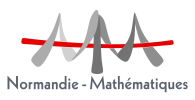Billards polygonaux
Billards polygonaux
Les billards polygonaux se divisent en deux types : les polygones rationnels (dont tous les angles sont des multiples rationnels de π) et les polygones irrationnels. Pour les polygones rationnels, il existe des outils puissants de renormalisation et de nombreux résultats profonds sur la dynamique du billard ont été établis. En revanche, les outils pour l’étude des polygones irrationnels relèvent essentiellement de la géométrie élémentaire et de la combinatoire, et les résultats connus sont beaucoup plus faibles.




